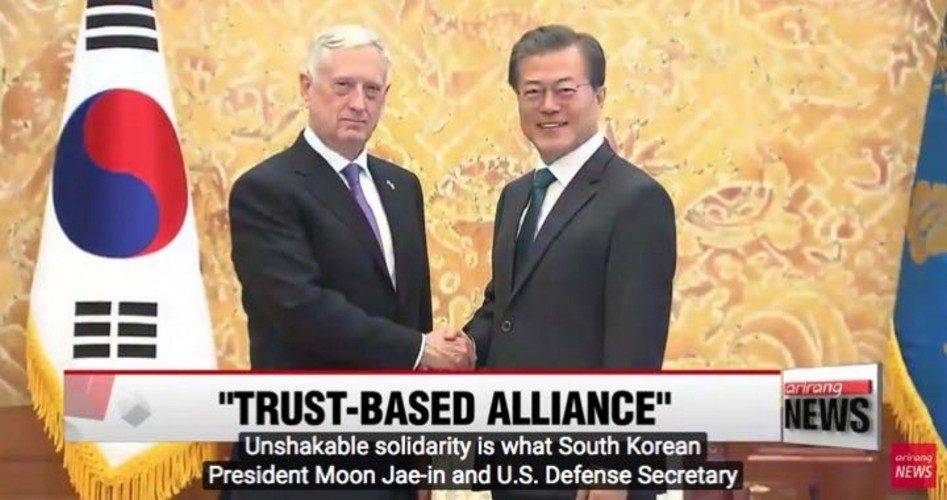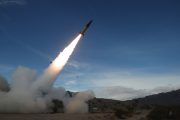
Speaking in Seoul, South Korea, on October 28, Secretary of Defense James Mattis (shown on left) said that the growing nuclear threat from North Korea has brought “a new urgency” to military and diplomatic cooperation between the United States and South Korea. “The threat from North Korea has grown markedly even since my trip here earlier this year,” Mattis said. “North Korea has accelerated the threat that it poses to its neighbors and the world through its illegal and unnecessary missile and nuclear weapons programs,” he added, emphasizing that the United States “does not accept a nuclear North Korea.”
Mattis spoke at a press conference while appearing alongside South Korean Defense Minister Song Young.
CNN reported that Mattis and Song said they had discussed a range of topics, including the pursuit of new military capabilities and the operational control of South Korean military forces in the event of a war on the peninsula.
However, the two defense chiefs said they had not discussed whether the United States would once again deploy tactical nuclear weapons to South Korea, a policy that was discontinued at the end of the Cold War.
“Given the national interest considerations at stake we believe that a tactical nuke is not worth deploying to the Korean Peninsula,” CNN quoted Song’s reply to a reporter who asked about the possibility of such deployment.
Mattis said “this subject has not been broached to me by the Republic of Korea government.” He reiterated that the goal of the international community is to denuclearize the Korean peninsula.
AP also quoted Mattis’s statement at the Seoul press conference, noting that the secretary added that regardless of what actions North Korea might try, it is overmatched by the firepower and cohesiveness of the decades-old U.S.-South Korean alliance. “I cannot imagine a condition under which the United States would accept North Korea as a nuclear power,” he said.
The report said that Mattis emphasized during his weeklong Asia trip, which included stops in Thailand and the Philippines, that diplomacy remains the preferred way to deal with North Korea. “With that said,” he added, “make no mistake — any attack on the United States or our allies will be defeated, and any use of nuclear weapons by the North will be met with a massive military response that is effective and overwhelming.”
The AP report also cited Song’s remarks at the press conference, observing that he and Mattis agreed to further cooperation on strengthening Seoul’s defense capabilities, including lifting warhead payload limits on South Korean conventional missiles and supporting the country’s acquisition of “most advanced military assets.” However, Song refused to answer when asked whether the discussions included nuclear-powered submarines.
The day before their press conference in Seoul, Mattis and Song also spoke to the media at the demilitarized zone (DMZ) that divides North and South Korea. “North Korean provocations continue to threaten regional and world peace and despite unanimous condemnation by the United Nations’ Security Council they still proceed,” Mattis was quoted as saying by CNN.
North Korea has certainly made many “provocations” in recent years by conducting tests of nuclear weapons and ballistic missiles designed to carry them. Its leaders have also made provocative statements. As one example, a spokesman for the Korean People’s Army (KPA) told KCNA (the Korean Central News Agency) last August that it would carry out a pre-emptive operation if there were signs of U.S. provocation (an interesting choice of words) and threatened to fire a long-range missile against the U.S. base in Guam.
The communist regime in Pyongyang has made an all-out effort to become a nuclear power, and its rhetoric exceeds anything the old Soviet Union delivered at the peak of the Cold War for sheer bravado. However, as we noted in an article in August, there are more likely explanations for North Korea’s threatening behavior than that it is a “rogue” state whose leader’s bluster exceeds his common sense.
We quoted from an article by The New American’s foreign correspondent, Alex Newman, who wrote:
Far from being “alone,” the communist regime in North Korea has had friends in high places from the beginning, and still does today. First and foremost, the regime is a puppet and close ally of the powerful communist dictatorship enslaving mainland China’s 1.3 billion people — a regime that is increasingly projecting its power globally.
We also observed in that article that the greatest threat posed by North Korea does not come from its missiles — which have been impressive during tests but are probably years away from practical operational use. A more likely development is that the conflict between Pyongyang and Washington will escalate into a second Korean War that will look much like the first Korean War. That is, a UN-directed operation against a Chinese supported enemy, where our military’s hands are tied by UN bureaucrats and victory is always elusive.
Considering that Mattis said that North Korea’s provocations continue “despite unanimous condemnation by the United Nations’ Security Council,” the secretary apparently regards the UN as some sort of ultimate authority in the matter. That is exactly the mindset that got us involved in the Korean War, which was a UN mission. The United States must defend its own interests and only its own interests, leaving our “allies” and the UN to defend theirs — without our funds or our troops.
Image: Screenshot of YouTube video released by Arirang News
Related articles:
North Korea Not Interested in Diplomacy Until It Has ICBM Capable of Reaching U.S. East Coast
Trump Imposes More Sanctions on North Korea, Calls Kim “Madman”
What Does the U.S.-North Korean War of Words Really Mean?
Official Says North Korean Missile Has “.00001 Percent Chance” of Getting Through Defenses
North Korea Tests Ballistic Missile Capable of Reaching U.S. Base on Guam
In Test That Will Send Message to N. Korea, U.S. Successfully Intercepts ICBM
Successful Test of THAAD Anti-missile System Offers Hope for U.S. Defense
South Korea Says North Korean ICBM Lacks Re-entry Capability
Aircraft Carriers Gather Off N. Korea; Pyongyang Tests Missile Able to Hit Ships
Recently Tested North Korean ICBM Said to be in Range of Most of U.S.
N. Korea Continues Missile Tests; U.S. Moves 3rd Carrier Strike Force to Western Pacific
North Korea Tests Another Missile, Says They Are Ready to Deploy
North Korea Threatens U.S. With “All Out War” and “Weekly Missile Tests”
North Korea Threatens to Attack U.S. Carrier Group; Detains U.S. Citizen
North Korea Warns of Nuclear Retaliation at Any Sign of U.S. “Aggression”
North Korea Admits Missile Launches Were Test of Possible Strike Against U.S.Bases in Japan



